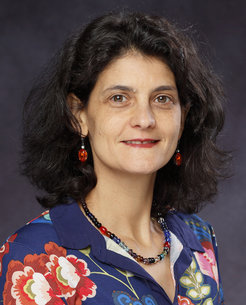The Alumni Interview: 10 Questions for Michaela Pelican

1. When were you at the MPI and what did you work on while you were here?
I was a member of the Department ‘Integration and Conflict’ from 2000 to 2006 while working on my dissertation project on interethnic relations and identity politics in the Cameroon Grassfields.
2. Where do you work now?
I am now Professor of Social and Cultural Anthropology at the University of Cologne and a member of the Global South Studies Center (GSSC).
3. How did the time you spent at the MPI shape your current career?
Besides furthering my research interests, I benefited from the opportunity to meet colleagues and scholars from all around the world and establish professional contacts and working relationships that are still relevant today. For example, it was at the MPI that I first met Japanese colleagues working on Africa. Later I was able to link up with the African Studies Center at the University of Kyoto and realize a six-month fellowship there. My stay in Kyoto resulted in a fruitful collaboration with Prof. Dr. Junko Maruyama and joint publications exploring our shared interest in indigenous peoples’ movements in Africa.
4. When you think back on your time at the MPI, what stands out most strongly?
Looking back at my time at the MPI, I cherish most the intellectually stimulating environment, the generous financial resources and administrative support, and the lively social atmosphere. This enabled my colleagues and me to concentrate on our research and enjoy academic life to its fullest. Supervising my own PhD students today, I have come to realize how privileged we were at the time.
5. Do you still have connections with the MPI, and if so, what kind of contact and with whom?
Last year my former MPI colleagues Rita Sanders and Aimar Ventsel and I organized a workshop on ‘Borders and Boundaries within and at the Edges of Europe’ at the University of Tartu where Aimar is based. Moreover, I frequently meet anthropologists who, at one point or another, have worked at the MPI. For example, in my current research on African migrants in China, which is part of the research consortium ‘Immigrant China’, I am collaborating with Caroline Grillot, a former member of the Department ‘Resilience and Transformation in Eurasia’ who worked on the Vietnamese-Chinese borderlands.
6. What is your current research topic?
My current research centres on South-South mobilities, with a particular interest in transnational migration between Cameroon and the Gulf States and China. At the same time, due to recent political developments in Cameroon (the so-called ‘Anglophone crisis’ that has deteriorated into a civil-war-like situation in the Anglophone parts of the country), my interest has been drawn back to questions of ethnicity and conflict, which were at the heart of my dissertation project realized at the MPI.
7. What are your plans for the future?
My intention is to strengthen the collaboration with colleagues in the Global South and to encourage knowledge exchange between South and North, both in teaching and research. Here I am building on on-going collaborations with institutions in Africa, Asia, and Latin America facilitated by the Global South Studies Center (GSSC).
8. Why did you become an anthropologist?
It was my grandmother who inspired me to go to Africa after completing school. My subsequent choice of studying anthropology was driven by my interest in understanding how people live and make sense of their social and natural environments and how we can respect and coexist with each other.
9. What advice would you give to students studying social anthropology today?
I recommend to students to take advantage of research opportunities and programmes supporting international student mobility. Moreover, I encourage them to start learning a non-European language early on, as it will make it easier later to learn the local language at their fieldsite, which is a vital part of anthropological research.
10. What text – whether a book or article – have you read recently that particularly impressed you?
I have learned a lot from the book Southern Theory: The Global Dynamics of Knowledge in Social Science by Raewyn Connell (2007, London: Polity Press). It is a challenging but informative read and reflects Connell’s genuine interest in and respect for Southern scholars. I read the book together with a class of master’s degree students, all of whom appreciated the opportunity to engage with knowledge production in different parts of the world and off the beaten track of mainstream anthropological teaching. I am also a big fan of the Freakonomics Radio podcast, which packages academic findings in an informative and entertaining way. My favourite episode is “The Troubled Cremation of Stevie the Cat”.
